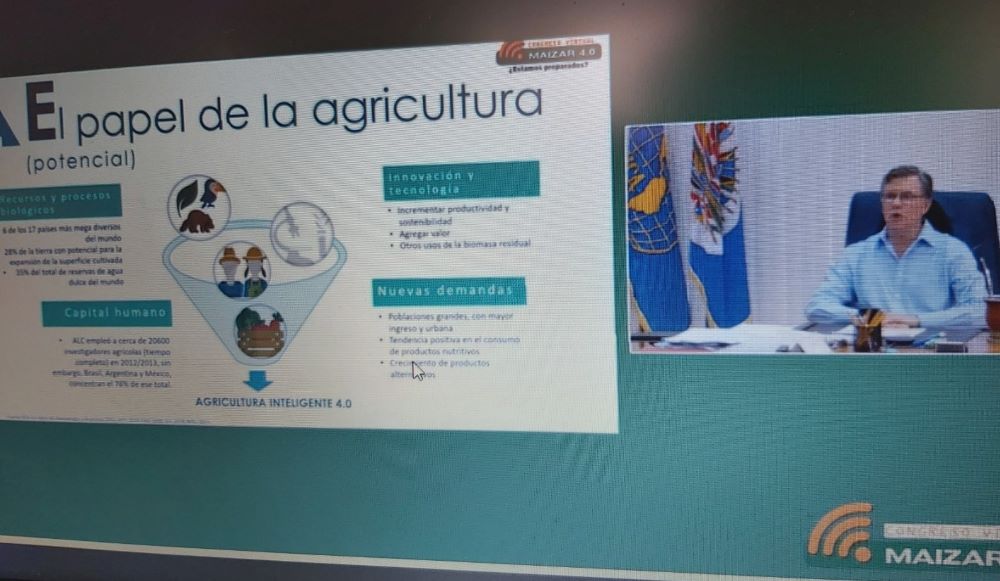Manuel Otero, the Director General of IICA, participated in the panel, “The Greening of Trade Policy and New Barriers”, which focused primarily on challenges involved in the supply and trade of food.

Buenos Aires, 6 July 2020 (IICA). – The Director General of the Inter-American Institute for Cooperation on Agriculture (IICA), Manuel Otero, participated in the panel, “The Greening of Trade Policy and New Barriers: Carbon Neutrality to Position Argentinian Products”, during the 4.0 Maizar Congress, which was held virtually.
For more than 10 years, the Corn and Sorghum Association of Argentina has been staging this event, which brings together all the stakeholders in the corn and sorghum scientific, production, commercial, industrial, food and export chains, with a view to contributing to the growth of the sector’s value chain.
The Director General of IICA participated in this year’s event, sitting on a panel moderated by the President of the Argentine Oil Industry Chamber – Cereal Exporters Center (CIARA – CEC), Gustavo Idígoras. Other panelists were Crispin Conroy of the International Chamber of Commerce (ICC); Nelson Illescas of the Foundation of the Institute for International Agricultural Negotiations (INAI) and Ernesto Viglizzo of the Group of Producing Countries from the Southern Cone (GPS).
“Agriculture is key to achieving the 2030 Agenda – Sustainable Development Goals. All of the development goals tie into agriculture, whether directly or indirectly”, maintained Otero, while highlighting the potential of the sector in Latin America and the Caribbean and the opportunities it opens up for the region.
He provided an overview of agriculture in the Americas, stressing its pivotal role as the main export sector in the region, while also pointing out that the Americas is also the leading net exporting region in the world for agricultural products, with a 14% share of global trade.
“Agriculture provides one quarter of total exports, with the region leading in markets such as tropical fruits, cereals, coffee, tubers and animal proteins, among others. We are not the leading producers, but we are the main exporting region”, he remarked.
In speaking about the pandemic, Otero remarked that it had given birth to a new spirit of solidarity and had created certain limitations in global trade, which in turn had triggered increased intraregional trade. “I hope this effect will be long-lasting”, he said, recalling the low levels of intraregional trade.
Otero noted that, “This pandemic has reduced economic activity and drastically curtailed trade. Yet, agriculture is called on to play a fundamental and strategic role in economic recovery, particularly in our countries”.
He spoke of the potential of the region’s agriculture sector to guarantee the food, nutritional and environmental security of the planet.
“We have the capacity to expand the agricultural landscape”, stressed the Director General, in closing. “Most of all, we have the necessary human capital – researchers and scientists. Indeed, science, technology and innovation will be decisive in the future of this sector that will have to increase productivity, ensure sustainability and make more efficient use of biomass residue, while preserving biodiversity. These will be attributes of tomorrow’s economically and nutritionally smart agriculture”.
More information:
Institutional Communication Division











